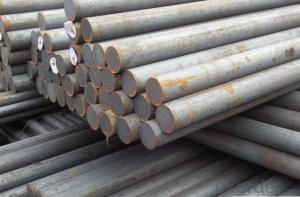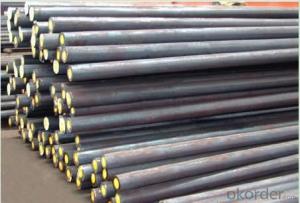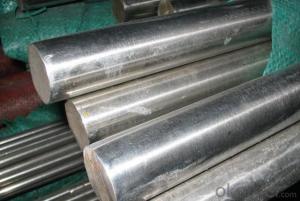Grade DIN35CrMo4 CNBM Alloy Steel Round Bar
- Loading Port:
- Shanghai
- Payment Terms:
- TT OR LC
- Min Order Qty:
- 25 m.t.
- Supply Capability:
- 10000 m.t./month
OKorder Service Pledge
OKorder Financial Service
You Might Also Like
Item specifice
Specifications:
1. Commodity: Alloy Steel Round Bar
2. Technical: Hot rolling
3. Length: Min. 5.8meter, according to requirement.
4.Diameter: 16mm-250mm
Chemical Composition:
Grade | C | Si | Mn | Cr | P | S | Ni | Cu | Mo |
35CrMo4 | 0.32-0.40 | 0.17-0.37 | 0.40-0.70 | 0.80-1.10 | ≤0.035 | ≤0.035 | ≤0.03 | ≤0.03 | 0.15-0.25 |
Mechanical Property:
Grade | Tensile Strengthσb (MPa) | Yield Strength | Elongation | Reduction of Area ψ (%) | Impact Akv(J) | Hardness |
σs (MPa) | δ5 (%) | |||||
35CrMo4 | ≥980(100) | ≥785(80) | ≥9 | ≥45 | ≥47 | ≤207HB |
Usage and Applications:
Gear, Sleevesspool,Shaft, Crankshaft, Pin
Packaging & Delivery:
Packaging Detail: Standard seaworthy packing or as customer required; all goods are packed in bundle with steel strips and shipped by break bulk vessel or container
Delivery Detail: 15~45 days
Production Flow:
EAF+LF+VD+ Forged+ Heat Treatment
Material prepare (billet) — heat up — rough rolling — precision rolling — cooling — packing — storage and transportation
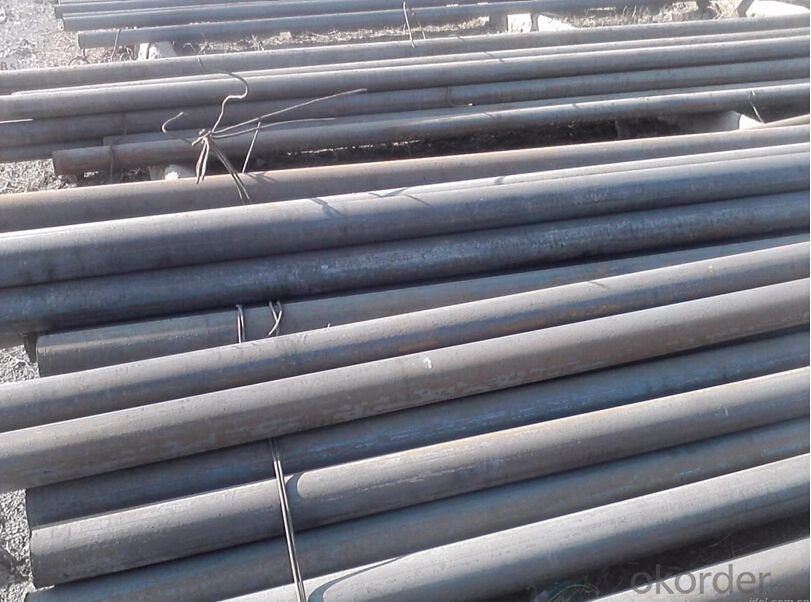
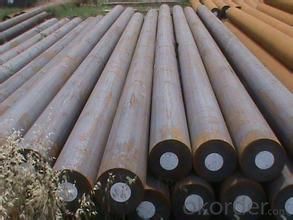
Quality Assurance:
1. We will strictly inspect our production that we sold according to the customer’s request.
2. Our steel reaches international quality standards.
3. Quality should be in conformity with the specification of the manufacturer. Quantity and packing conditions should be in conformity with the term in the contract.
4. Should the packing found damaged, the buyer has the right to claim to the seller
- Q:Can special steel be used for electrical applications?
- Yes, special steel can be used for electrical applications. Special steel has excellent electrical conductivity and can be used in various electrical components and equipment like power transformers, generators, electrical motors, and electrical transmission systems.
- Q:What are the different heat treatment processes for special steel?
- There are several heat treatment processes for special steel, including annealing, quenching, tempering, and normalizing. Annealing involves heating the steel to a specific temperature and then slowly cooling it, which helps to enhance its ductility and reduce internal stresses. Quenching is a rapid cooling process that involves immersing the steel in a liquid, such as water or oil, to increase its hardness and strength. Tempering is a process that follows quenching, where the steel is heated to a lower temperature and then cooled, which helps to relieve internal stresses and improve toughness. Normalizing is a process similar to annealing, but the steel is air-cooled instead of being slowly cooled, resulting in a more refined grain structure and improved mechanical properties.
- Q:How does special steel perform in high-pressure hydrogen environments?
- Special steel performs well in high-pressure hydrogen environments due to its high strength, corrosion resistance, and ability to withstand hydrogen embrittlement. It offers reliable performance and minimizes the risk of hydrogen-induced failures, making it a suitable choice for applications such as hydrogen storage, transportation, and fuel cells.
- Q:How is special steel used in the construction of buildings and bridges?
- Special steel is commonly used in the construction of buildings and bridges due to its high strength and durability. It is used in various structural components such as beams, columns, and reinforcement bars, where its exceptional strength-to-weight ratio allows for the creation of lighter and more efficient structures. Additionally, special steel's resistance to corrosion and extreme weather conditions makes it a suitable choice for projects in harsh environments. Overall, special steel enhances the structural integrity and longevity of buildings and bridges, ensuring their safety and reliability.
- Q:What are the requirements for special steel used in telecommunications infrastructure?
- The requirements for special steel used in telecommunications infrastructure include: 1. High strength: Special steel used in telecommunications infrastructure should have high tensile strength to withstand the heavy loads and stresses imposed on the structures. This ensures that the infrastructure remains stable and secure. 2. Corrosion resistance: As telecommunications infrastructure may be exposed to various environmental conditions, including moisture and chemicals, it is crucial for the special steel to have excellent corrosion resistance. This helps to protect the infrastructure from rust and deterioration, extending its lifespan. 3. Good weldability: Special steel used in telecommunications infrastructure should have good weldability to facilitate the construction and installation processes. This allows for easy joining of different components, ensuring a strong and reliable structure. 4. Durability: The special steel should be able to withstand the harsh conditions it may be exposed to over its lifetime. It should have high durability to resist fatigue, impact, and other external factors that could potentially compromise the integrity of the infrastructure. 5. Lightweight: While strength is important, special steel used in telecommunications infrastructure should also be lightweight. This enables easier transportation, handling, and installation of the components, reducing costs and time required for construction. 6. Fire resistance: Special steel used in telecommunications infrastructure should have good fire resistance properties to prevent the spread of fire and ensure the safety of the infrastructure and the surrounding areas. 7. Electrical conductivity: Telecommunications infrastructure often requires electrical grounding and bonding. Therefore, special steel used in these applications should have good electrical conductivity properties to ensure effective grounding and minimize electrical interference. Meeting these requirements ensures that the special steel used in telecommunications infrastructure can provide the necessary structural integrity, longevity, and performance to support reliable and efficient communication networks.
- Q:What is the purpose of cold drawing in special steel production?
- Cold drawing is utilized in special steel production with the aim of enhancing the mechanical properties and dimensional accuracy of the steel. This technique involves pulling the steel through a die at room temperature, which leads to a reduction in the cross-sectional area and an increase in the length of the steel. By undergoing this process, the microstructure of the steel is refined, resulting in improved strength, hardness, and toughness. Furthermore, cold drawing has the ability to improve the surface finish and straightness of the steel, ensuring precise dimensions and making it suitable for a wide range of applications that require high-quality steel. In summary, cold drawing plays a vital role in improving the performance and quality of special steel, making it more dependable and efficient in various industrial sectors.
- Q:What are the different surface treatments available for special steel?
- There are several surface treatments available for special steel, including galvanizing, powder coating, electroplating, passivation, and nitriding. These treatments enhance the steel's durability, corrosion resistance, appearance, and overall performance in various applications.
- Q:Can special steel be used for making automotive engine components?
- Yes, special steel can be used for making automotive engine components. Special steel is often used in the manufacturing of engine components due to its high strength, durability, and resistance to wear and corrosion. Engine components such as crankshafts, connecting rods, camshafts, and valves require materials that can withstand high temperatures, pressures, and mechanical stresses. Special steel, such as high-strength alloy steel or stainless steel, meets these requirements and provides the necessary performance characteristics for automotive engines. Additionally, special steel can offer weight reduction benefits, which can contribute to improved fuel efficiency and performance of the engine. Overall, special steel is a suitable material choice for making automotive engine components due to its exceptional mechanical properties and ability to withstand the demanding operating conditions of an engine.
- Q:What are the properties of shock-resistant alloy steel?
- Shock-resistant alloy steel is a type of steel that possesses specific properties that make it highly resistant to shock and impact. These properties include high tensile strength, toughness, and hardness. It is also known for its ability to withstand sudden changes in temperature, making it suitable for applications in extreme environments. Additionally, shock-resistant alloy steel has excellent fatigue resistance, corrosion resistance, and wear resistance, making it ideal for use in industries such as aerospace, automotive, and defense.
- Q:How does special steel enhance the durability of products?
- Special steel enhances the durability of products by providing superior strength, hardness, and resistance to wear, corrosion, and extreme temperatures. Its unique composition and manufacturing techniques make it highly efficient in withstanding heavy loads and external factors, thereby ensuring longevity and reliability of the products it is used in.
1. Manufacturer Overview |
|
|---|---|
| Location | |
| Year Established | |
| Annual Output Value | |
| Main Markets | |
| Company Certifications | |
2. Manufacturer Certificates |
|
|---|---|
| a) Certification Name | |
| Range | |
| Reference | |
| Validity Period | |
3. Manufacturer Capability |
|
|---|---|
| a)Trade Capacity | |
| Nearest Port | |
| Export Percentage | |
| No.of Employees in Trade Department | |
| Language Spoken: | |
| b)Factory Information | |
| Factory Size: | |
| No. of Production Lines | |
| Contract Manufacturing | |
| Product Price Range | |
Send your message to us
Grade DIN35CrMo4 CNBM Alloy Steel Round Bar
- Loading Port:
- Shanghai
- Payment Terms:
- TT OR LC
- Min Order Qty:
- 25 m.t.
- Supply Capability:
- 10000 m.t./month
OKorder Service Pledge
OKorder Financial Service
Similar products
New products
Hot products
Hot Searches
Related keywords

